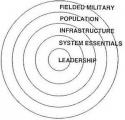This comment from Slap:
got me thinking. What I come up with is that we use the same word "cause" to mean two quite different things:I say a cause is nothing more than a large group of people with a common motive. It turns into an insurgency/revolution when it reaches a certain tipping point as to the total number of people involved.
1. In one sense, we look at "cause" and "effect" based on a set of more or less objective facts: e.g., what factors "caused" the accident. Those factors span a spectrum from the most "proximate" to the most remote ("but for causation", "ultimate causation" - but for a nail, the kingdom was lost). In the accident case, we focus on the more proximate causes and the extent to which each of them contributed to the accident in assessing comparative fault (where the motivations of the parties does come into play). In this rather inexact form of art, the jury finds A, X%; B, Y%; C, Z% at fault and awards damages accordingly. And, certainly, folks use a similar process to consider the "causes" of an insurgency.
2. In another sense, we look at "cause" not with respect to effect, but as one or more of the "Causes" that appear in the "Narratives" of the revolutionaries and counter-revolutionaries. Each of those "Causes" may or may not have a basis in a "cause" that we find objectively (Meaning 1). Each of them does, however, have a basis in the perceptions and motives of the populace as they view their individual situations. As to those "Causes", "Motives" are very much intermixed and crucial to the feedback process which frames the "Narrative" (whether revolutionary or counter-revolutionary). That is the basis for Mao's "from the people, to the people", where the "Narrative" is taken in raw form from the People, shaped by the Party, and then returned to the People, who reshape it in a continued "chicken & egg" scenario. The "Narrative" (as one of the factors) probably will have an effect on the outcome of the insurgency - and, hence, would be a "cause".
To sum the distinctions in blunt terms: People die because of a "cause"; people die for a "Cause".
-------------------------------
This continuation is somewhat thinking out loud; although the thoughts have occured to me before.
In Southeast Asia, we can look at four countries: Indochina, Malaya, Indonesia and the Philippines. As to them, we can accept some common factors:
1. All were feudal (as the Marxists used that term) and colonial, pre-WWII.
2. All were occupied by the Japanese during WWII (showing the people that an Asian military could defeat Western militaries).
3. During WWII, nationalist movements were strengthened.
4. At the end of WWII, the colonial powers returned (length of stay varied).
5. After WWII, insurgencies developed in all (in Indochina and Indonesia, we have I and II cases).
We could (simplistically, IMO) look at WWII as the "cause" of those insurgencies and that the "Causes" were "anti-feudalism" and "anti-colonialism". There is some truth in that, but the realities were more complex.
In considering those six insurgencies (Indochina I & II, Malaya, Indonesia I & II, the Philippines), Bill Pomeroy (CPUSA author and special operator) left us with some good advice in his Guerrilla Warfare & Marxism (1968, International Publishers, the CPUSA bookstore - book no longer in catalog), p.200:
With that caveat in mind, considering the "Causes" expressed in the "Narratives" (both revolutionary and counter-revolutionary) in each of these six instances gains some understanding as to one factor (among many) that made each of them different from the others, in both development and outcomes. That is an exercise that I've not yet completed.The theory that there is an "Asian model" of contemporary guerrilla liberation struggles (it is assumed to be patterned on the Chinese experience) breaks down with a close examination of each struggle. This has been pointed out in the Introduction, but it needs to be stressed further that liberation movements in the region have been variegated, each with its own historical roots, deriving from the peculiar nature of the colonial system in each colony, and each pursuing its own course of development.
Regards
Mike













 . What is an "Act of God"? I find it fascinating how the line of inclusion / exclusion operates on it even as the category is still accepted.
. What is an "Act of God"? I find it fascinating how the line of inclusion / exclusion operates on it even as the category is still accepted. .
. 

Bookmarks